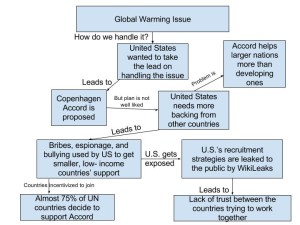2) The diagram I created starts off with the main idea that the issue of global warming is a main concern among most countries. The United States wanted to be a key player in trying to reduce this issue, while at the same time, making sure that they will choose a plan that helps them the most. The U.S. pushed the Kyoto protocol away because there were many restrictions and laws that were aimed at larger countries, such as the U.S., and instead, the United States proposed the Copenhagen Accord. This was much more favorable to larger countries, but hurt developing countries that aren’t able to get their hands on the supplies that the larger countries have at their disposal. in order to get support for this, the U.S. began to promise money to smaller countries for their support. When any country started to doubt the U.S., the United states would then dangle the money in front of them and threaten to take the opportunity away from them. WikiLeaks then got involved when they got their hands on many of the negotiation conversations that were occurring between the U.S. and the smaller countries. They made these conversations public, showing how the U.S. was trying to force these countries’ hands into signing onto their agreement. Even with about 75% of countries supporting the Copenhagen Accord, the plan fell through because of lack of trust between the countries involved. The U.S.’s ethics were all over the place in trying to get what the ybelieved the right plan to be to help with global warming.
3) In my opinion, I believe that it was right for the cables to be made public. We as citizens have the right to know how our government is operating and should have a say in the manner in which some business is conducted. The U.S. should have tried to solve this problem in a way that helped out the most countries, or benefit at least everyone involved in some way. Instead, there was a loss of trust between countries because of the bribery and espionage. Global warming is an issue that will require every player to participate in order to be solved. Without trust, there is no way that everyone will decide on efficient steps without checking each others proposals along the way, to make sure that no one is getting a better deal. This was a rough issue for developing countries. They were given the choice of jumping on board to a plan they didn’t like in order to get financial aid right away, or stay away from it all together and miss out on a huge financial opportunity for their country. Instead of using the wrong ways to get support, the U.S. could’ve tried to modify plans to fit different countries needs and make sure that everyone got an equal deal. The smaller countries deserve respect and should not be left behind by the more developed countries. The U.S. could’ve been altruistic and made sure that all the countries could get together to solve an issue that they all play a part in, but instead, they went about this selfishly and lost trust.
Jason Brown

